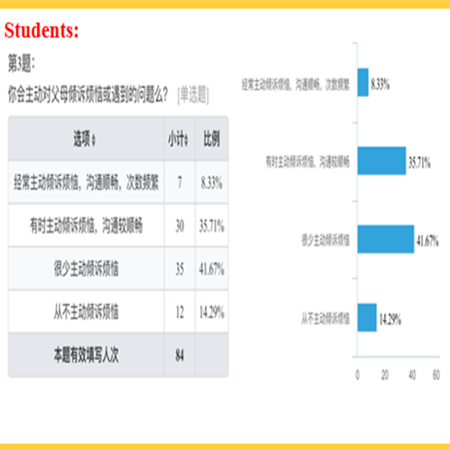Section B (2b-3b)
洛阳市第四十八中学 郭异斐
一、教学分析
(一)教材分析
本课教材选自人教版英语教科书八年级上册 Unit 10 Section B部分。Section B以学生们的烦恼作为切入点,贴合实际,信息量大,可以作为读写整合的素材。文本的语言难度适中,词汇量不大但出现了一些短语搭配,对于八年级上学期的学生来说,需要结合文本理解。
(二)学生分析
八年级的学生正处于青春期,在处理问题时会遇到一些困难,这给文本内容的解读提供了便利。八年级上学期的学生还不能够自主地进行文章信息的整理和概括从而达到仿写,因此在活动的设计上应注重引导学生进行信息采集和概括,为更好地理解文本和仿写。
(三)学习目标
1. To read and search the information to know how to solve the problems;
2. To talk about worries and problems in our daily life and try to give possible solutions with if-clauses;
3. To learn the available and effective ways to solve problems in daily life.
(四)重点难点
1. Find the specific information in a passage;
2. Write a passage after reading.
(五)教学思路
本节课为读写整合课。在阅读板块中,教师通过问题导入将学生快速引入主题,并通过速读、寻读、重难点分析几个步骤使学生由浅入深地理解文本。同时,在阅读中,教师有意识地引导学生进行结构划分和语汇应用,为学生作为提供铺垫。在写作版块中,学生通过小组讨论明晰写作结构、充实写作内容,为写作提供“骨”和“肉”。当堂写作后,教师示范评改和生生互评实现了学生作文的当堂评价和修改。最后,学生通过学习能够掌握阅读技巧,提取阅读信息,进行模仿写作,并在课堂中体会与家人沟通的重要性,学会如何处理问题。
二、教学设计
Step 1. Lead-in
1. Brainstorming.
If you have problems, who do you often go to for help?
【设计说明】
通过问题导入,学生快速进入解决问题的话题中来。学生讨论中,大多数学生会选择朋友作为倾诉对象,这一现象在课堂的最后将会着重讨论。
Step 2. While-reading
Task 1. Read the passage quickly and find out the main idea of the passage.
A. If people have problems, they should get advice from an expert.
B. If people have problems, they should talk to other people.
C. If people have problems, they should keep them to themselves.
Task 2. Group work. Read the passage again and answer the questions.
1) What is the worst thing to do if you have a problem?
2)Why didn’t Laura want to tell her parents about her lost wallet?
3)What is the first thing you should do when you want to solve a problem?
4)Why can our parents give us good advice about our problem?
Task 3. Fill in the blanks with the phrases in the box.
|
discuss your problems tell your parents unless you talk run away from
talk to someone share her problems to do nothing
|
Students often have a lot of problems and worries. Laura Mills thinks the worst thing is _____________. She thinks you’ll feel worse if you don’t ______________ about your problems. Laura remembers that she once lost her wallet and was afraid to _____________ about it. Now she believes you cannot feel better _______________ to someone. She says she will always __________________ in the future. Robert Hunt agrees with Laura. He thinks you should not _______________ your problems, but you should try to solve them. If you cannot talk to an expert like Robert, you can ____________________ with your parents because they have a lot of experience.
【设计说明】
阅读中活动由速读、寻读和复述三部分组成。通过层层深入的任务,使学生对于文章结构和内容逐步了解、理解。同时,对于读后的活动打下良好的基础。
Step 3. Post-reading
Task 1. Pair work. Talk about the students’ problems and give solutions with the sentences below.
A: ... has a problem.____________________________.
What should he/she do?
B: I think he/she should __________________________.
If he/she _____________, he/she will ____________.
Task 2. Group work. Do a survey in your group to talk about your problems and write down your solutions.
【设计说明】
读后既是对阅读部分的总结,也是写前的准备工作。写前的准备工作主要是突破难点,即句型的运用和写作内容的把握。前期的口头总结和口头造句为写作提供了一定的句型基础;小组调研为写作提供了内容准备。
Step 4. Writing
Use the structures below to write a passage according to the survey result.
|
My friend _____________ has a problem.
He/She _________________________________________
________________________________________________.
I think he/she should _______________________________
________________________________________________.
If he/she _________________________________________,
he/she will _______________________________________.
|
【设计说明】
从口头对话到仿写文章。学生由写前准备的句子延伸到篇章,由于在前期对于结构已经有所了解,对句子已经仿写过,因此在这个环节学生能够有比较清晰的思路进行仿写。
Step 5. What should we do to solve our problems?
Show the survey result on Parents- Children Communication which shows that few students in the class want to ask their parents for help. Show their parents’ hope for communication.
Try to share your problems with your parents.
Believe that they are always there to help you.
Step 6. Homework
Tell your parents about your recent problems. Write a passage about your problems and the solutions your parents give.



